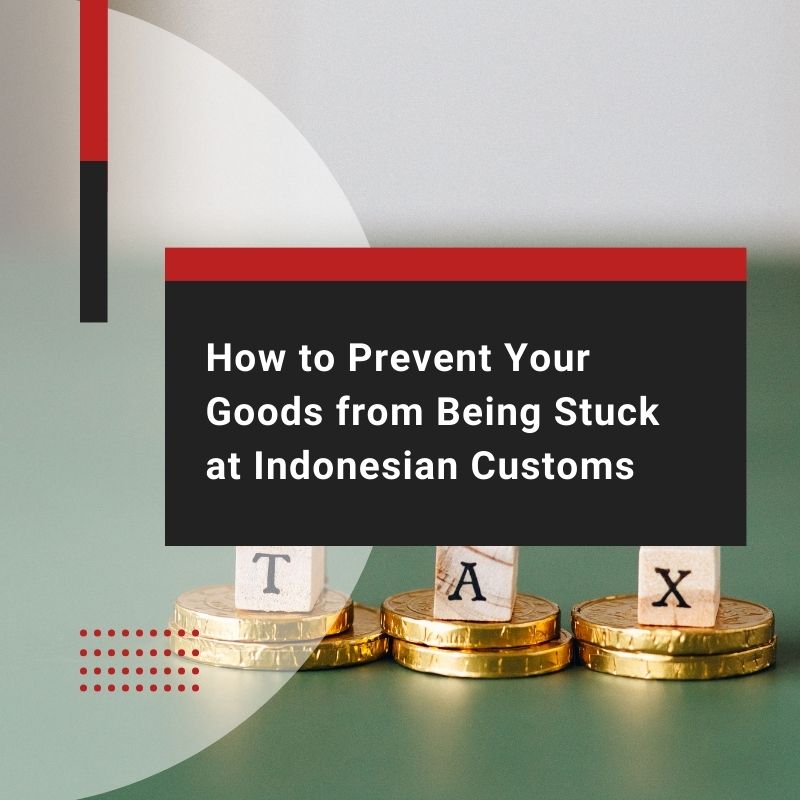As an entrepreneur running an export or import business in Indonesia, having a shipment held in Indonesian customs that causes a dreaded shipment delay is likely to destroy your reputations and incur cost in terms of revenue loss. Whether it is incoming or outgoing goods, whatever gets stuck will keep you up all night pacing at the office thinking of solutions.
It is not surprising for business owners doing business in Indonesia that the import regulations in Indonesian can change constantly and many business owners’ worst nightmare suddenly become a reality when their goods get stuck in Indonesian customs.
This article provides you with guidelines on how to navigate the bureaucratic red tape in Indonesia and how you can prevent your goods from being stuck at Indonesian customs from the very beginning, so that you can run a seamless export or import business in Indonesia.
Why Imported Goods Are Stuck at Indonesian Customs?
There are several reasons your goods might be stuck at Indonesian customs. These reasons can be categorised in their severity from high to low. High severity means your goods are actually prohibited for being imported into Indonesia, whereas low severity means that your imported goods might have incorrect paperwork.
Inexperienced consignee
The consignee you engage in Indonesia for your imported goods may not have an import license or relevant supporting documents for import. Some specific goods will need more paperwork or documents in addition to just the import license.
Irresponsible forwarder
The forwarder of your imported goods in Indonesia does not inform you about the required documents that you need to show to the customs. This is why your goods get stuck once they arrive in the territory of Indonesia.
Red Channel inspection
Pemeriksaan Jalur Merah (PJM) is the red channel inspection in Indonesia. It is a physical inspection performed on selected imported goods in addition to the document verification. Thus, it is not uncommon that many end-to-end import or export providers will use the door-to-door services so that they do not have to pay duty and taxes to the customs.
However, as of July 2017, the government of Indonesia enforced a new regulation to shut down this kind of service in the country. This shutdown has led to many import goods stuck in customs due to unpaid taxes and incomplete documents.
How Long Does It Take to Get Goods Stuck in Customs in Indonesia?
The duration for which goods may remain stuck in customs in Indonesia can vary depending on several factors. These include the type of goods being imported, the accuracy and completeness of the import documentation, and whether the goods are subject to physical inspection.
However, it typically takes a few days to a few weeks for goods to be released from customs. Here are some of the reasons why goods may get held up in customs:
- Incomplete or inaccurate documentation: The most common reason goods are stuck in customs is incomplete or inaccurate documentation. This can include missing or incorrect information about the goods, the importer, or the country of origin.
- Additional permits required: Some types of goods require additional permits from the Indonesian government before being imported. For example, cosmetics, pharmaceuticals, and IT equipment require additional permits.
- Physical inspection: Customs officials may select goods for physical inspection to verify the accuracy of the import documentation or to check for contraband. Physical inspections can take several days or even weeks to complete.
If your goods are stuck in customs, there are a few things you can do to try to expedite the process:
- Contact your freight forwarder or customs broker: Your freight forwarder or customs broker will be able to provide you with information about the status of your goods and help you resolve any issues that are preventing them from being released.
- Provide all required documentation: Ensure you have provided customs with all of the required documentation for your goods. This includes the commercial invoice, packing list, bill of lading, and other relevant documents.
- Pay any outstanding duties and taxes: If you owe any duties and taxes on your goods, you must pay them before they can be released from customs.
What are the Documents Required for Import?
Whatever the reason your goods are held, you will need to prepare the following documents in order to get your goods moving and avoid issues with customs in Indonesia.
Import licenses
First and foremost, you will need to acquire an Importer Identification Number (API) through the newly implemented Online Single Submission (OSS) system. Then, you can start importing goods with API.
Before you go ahead with an API application, you need to know if you are going to be a general importer or if you would like to import goods such as raw material or machinery for your own production. An API-U is required for the general importer and an API-P is necessary for import for your own production.
Proforma invoice or commercial invoice
A proforma invoice or a commercial invoice is needed with adequate information for customs to determine the import duties, taxes and shipment eligibility. The total value of the shipment is presented in US dollars.
Compared to a commercial invoice, a proforma invoice is a simple invoice with only sufficient information to decide the duties and arrange the consignment examination. On the other hand, a commercial invoice has more information that provides the import goods’ real value.
Packing list for shipment
You will need to prepare a packing list with information such as product details, gross weights, dimensions, and volume of shipment. A packing list together with your shipment is to check if your goods for shipment are packed properly and accurately. It has a similar purpose as a proforma or commercial invoice.
Air Waybill/Bill of Lading
Air waybill (AWB) and bill of lading (BL) are important documents for the acknowledgement of the shipment transport. An AWB is required for goods imported through air freight; and a BL is mandatory for goods shipped via sea freight.
What are the Procedures at Indonesian Customs for Export Import Business?
It is highly recommended for you to get familiar with procedures at the Indonesian customs in order to tackle the issue that many importers face in Indonesia.
1. Import Declaration Form (Persetujuan Impor Barang – “PIB”)
It is compulsory to declare all imported goods to the customs in Indonesia. The PIB will be released upon the process of the shipment. This form contains information such as import duties (different rates based on the HS code), 10% value-added tax, and 2.5% income tax.
With or without the import licenses, the PIB will be issued anyway for goods declaration. A PIB does not mean that your shipment is released because you will still need all the necessary import licenses.
2. Red Channel Inspection (Pemberitahuan Jalur Merah – “PJM” )
All imported goods will be processed through three channels upon arrival:
- Green channel: to verify documents, the goods will be cleared
- Yellow channel: to request for additional documents in order to release the imported goods (Cekindo can assist in preparing these supporting documents)
- Red channel: to inspect physical goods for every shipment, one by one
Oftentimes, your imported goods may be held in the red channel due to the changes in regulations, taxes, HS codes, etc.
If this happens, the customs will release a Notice of the Red Channel. To obtain the goods being held at the red channel, you will need to provide Cekindo with the PJM’s response and the contact of the customs officer who is in charge of your goods. Cekindo will assist you in getting your goods out of the Indonesian customs.
What are the Solutions if Your Goods Are Stuck at Indonesia’s Customs?
There are three common solutions for the Indonesian customs to release your goods:
Pay the incurred charges t o PIB
Paying the fees due to PIB is one of the three solutions discussed. These fees include import duty, income tax, value-added tax, and consignee charges. The total charges to get your shipment out of the customs can be quite pricey.
Put your goods up for auction
Another option is to put your goods up for auction. This involves a bidding process and your goods will be sold to the highest bidder in the auction.
Re-export then re-import
The customs might offer the third option, which is you need to re-export and then re-import your goods, as long as your goods do not fall under the prohibited items.
Alternative Solution for Export Import Business in Indonesia via Undername Import
All in all, the best and most convenient way for you to import your goods without worrying that they will be stuck at the customs is through this ultimate solution: engaging in an undername import service in Indonesia.
An undername importer, also known as the importer of record, enables you to import your products to Indonesia immediately without the need to obtain any import licenses. Through Cekindo’s undername import service, you are not liable to any taxes as well because it will be taken care of.
Get in touch with us today to learn more about exporting goods to Indonesia and our undername import service by filling in the form below. Or visit our offices in Jakarta, Bali and Semarang. We can help your export or import business in Indonesia easier.
Daris Salam
COO Indonesia at InCorp Indonesia
With more than 10 years of expertise in accounting and finance, Daris Salam dedicates his knowledge to consistently improving the performance of InCorp Indonesia and maintaining clients and partnerships.


